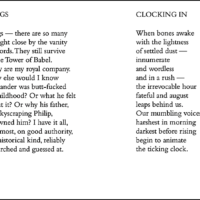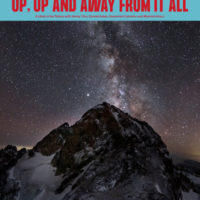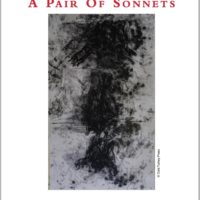of a sonnet that appeared in ‘Your Obituary Is Waiting,’s . . . Here it is, with apologies to circus folks. And here he is … nasty, angry, and dopey.
Fascinating Passages from Fascinating Books
‘He did not believe that men were born good, and he admitted original perversity as an element to be found in the depths of the purest souls—perversity, that evil counsellor who leads a man on to do what is fatal to himself precisely because it is fatal and for the pleasure of acting contrary to law, without other attraction than disobedience, outside of sensuality, profit, or charm. This perversity he believes to be in others as in himself. . . . As much as possible he banished from poetry a too realistic imitation of eloquence, passion, and a too exact truth.’
Cold Turkey Press: ‘Another Pair of Sonnets’
My sonnets don’t usually come in pairs, although looking back on them I can see them being paired sometimes as sequels or cousins. Paradoxically, these two came as a pair because they are so different from each other. The darker mood of the one that came second (“Clocking In”) rebukes the lighter mood of the one that came first (“Kings”). Why I should have objected puzzles me now.
From the Design Department
Cutting Edge: Up, Up and Away Off the Page
The designers of The New York Times Magazine are at it again. Do they think edgy makes sense when their design looks like the cover was badly trimmed? Yes, the headline reads “UP, UP AND AWAY FROM IT ALL.” But if the rationale for the design was to get so far up and away, why take half measures? Why not clip off the name of the magazine entirely? Now have a look at the off-the-page design of the spread complete with layout markups, which introduces the cover story on page 43. My guess is the editors want to persuade us the magazine is spontaneous and improvisatory (as in no longer the Gray Lady of legend, which it actually hasn’t been for many years).The spread works nicely. Much better than the cover. But why are they trying so hard?
Good Question: ‘Who’s Your Death Hero?’
Although Albert Camus does not come up in WHO’S YOUR DEATH HERO? — a conversation between the filmmaker Richard Kern and the writer who goes by the name of Supervert — he would be my candidate in answer to the title. Camus’s declaration, “I want to keep my lucidity to the last and gaze upon my death with all the fullness of my jealousy and horror,” conveys precisely what this book is about as if he’d read it himself.
Nailing It
Kayleigh McEnany (aka Baghdad Bob or Comical Ali) and the Clown King do their thing. White House press secretary: “We will not see diseases like the coronavirus come here.” Trump predicts number of Covid-19 cases in the U.S.: “Gonna be down to close to zero … We’ve done a very good job.”
The Battle Over the Supreme Court
Getting down to brass tacks . . . and brass knuckles.
Cold Turkey Press: ‘A Pair of Sonnets’
‘Both belong to a cycle of nine, mostly written during my stay in the rural Connecticut countryside to escape the Covid-19 pandemic during the Spring and Summer of 2020. Both are addressed to writers I admire. “Last Breath” begins the cycle. It was written while remembering my late friend Carl Weissner, before the pandemic began. “The Way the Lines Break” ends the cycle. It was written toward the end of my stay and is addressed to Théophile Gautier, whose poems and stories I was reading thanks to the suggestion of my friend Gerard Bellaart.’ — JH
‘Notorious’ Doesn’t Begin to Describe Her
‘Ruth Bader Ginsburg came to the Supreme Court not just as another federal judge. She reflected women’s emergence as fully equal members of American society in the late 20th century.’ — Jess Bravin, Supreme Court Correspondent for The Wall Street Journal
Obscene Advertising
Here’s a first-class illustraton of blasé consumerism. It appeared as I read through a NYT story online about the genocidal campaign against the Rohingya minority in Myanmar. The last time I noted this kind of blatant obscenity was an ad for high-end designer clothing placed next to a print story about children victimized by Hurricane Katrina. You can see similar examples any day of the week.Today, for instance.
GC CUNY at the Center of the Conversation
‘Coalitional Democracy’ One-Day Conference
Goes Online to Explore Activism & Social Justice
THE STONE CENTER ON SOCIO-ECONOMIC INEQUALITY: ‘In these tumultuous times, new forms of activism and political engagement are needed more than ever.Movements to expand the social safety net in response to the devastation of the coronavirus, along with the Black Lives Matter protests, are working both inside and outside of electoral politics, with on-the-ground activists often taking the lead. These new developments join long-standing efforts to reduce inequalities of all forms. In this urgent context, what kinds of coalitions are needed for broad-based change to occur, given the economic, political and social divides in the country? What are effective models—past and present—for pushing beyond traditional approaches? Spend a day learning from thinkers, scholars, politicians, and activists about ways to build coalitions across issues and lines of race, gender, class, and sexuality in order to create a more equal and democratic society.’
Fascinating Passages from Fascinating Books
‘Really, poems by William Burroughs? Yes indeed, and what we know as The Cut-Up Method he initially called ‘Newspeak Poetry,’ making clear his original frames of reference.’ — MINUTES TO GO Redux
A Sweet Child’s Vision . . .
. . . not long before covid makes me think of Chagall.
Fascinating Passages from Fascinating Books
[Alexander’s father] Philip’s training for power was proceeding along useful if unorthodox lines. His experience as a member of the Macedonian royal household had given him an understandably cynical view of human nature: in this world murder, adultery and usurpation were commonplace. … Philip took it as axiomatic that all diplomacy was based on self-interest, and every man had his price: events seldom proved him wrong.
A New Online Event Series
‘CHANGE’ at The Graduate Center, CUNY
A time of extraordinary social upheaval demands—and presents new opportunities for—CHANGE. In this new weekly series, leading thinkers explore ways to create a more democractic society.
GC CUNY at the Center of the Conversation
Leon Levy Center for Biography to Launch 2020 Events
Eddie S. Glaude Jr. on James Baldwin • Rick Perlstein on Ronald Reagan • Fredrik Logevall on John F. Kennedy • David S. Reynolds on Abraham Lincoln • Judith Thurman to give the Annual Leon Levy Lecture on Biography • David Nasaw on his new book, ‘The Last Million’
William Burroughs’s Prophetic Mutterings
‘This is Burroughs the self-styled revolutionary at his most historically explicit, the courageous whistle-blower in 1960 denouncing and exposing media magnates, business moguls, bankers, political leaders and scientists as part of a larger, deeper conspiracy at work behind the scenes of the mid-twentieth century.’ By Oliver Harris BATTLE INSTRUCTIONS addresses particular individuals, which marks a […]
















![Burroughs wearing his fedora. [Photo: Harriet Crowder]](https://www.artsjournal.com/herman/wp/wp-content/uploads/2015/02/Burroughs-fedora360jpg-200x200.jpg)